![]()
'I don't prepare (for a character), I become it. I don't have to think about a character too much, I become it. I give a lot of attention to detailing. Once I become the character, I go and deliver the scene.'
Aishwarya Rai Bachchan gives us an insight into her life.
Aishwarya Rai Bachchan is having a busy day.
So busy, that she cannot even spare a minute to talk to her husband, Abhishek Bachchan.
"Abhishek wanted to talk to me for a minute but I was so late that I left home and called him from the car. It's been crazy!" she exclaims to the media assembled at the Bachchan's office in Juhu, in the western suburb of Mumbai.
The actress had attended the Sarbjit screening with her family the previous night, and then headed to Shah Rukh Khan's home to party with Apple CEO Tim Cook. "We reached home between 4 and 5am," she says.
Aishwarya may be tired but she remains cheerful throughout the interview, giving l-o-n-g answers.
"I am trying to answer all the questions even before you ask them, so you don't need to ask me anything," she tells us.
Aishwarya spoke about Sarbjit, her daughter Aaradhya, and her famous purple lips in Cannes. Patcy N/Rediff.com listens in.

Why did you choose to have purple lips at Cannes?
I work with L'Oreal, it is really their prerogative and I am cool with it.
I have gone to Cannes for years -- initially, with my films like Devdas, then as a jury member, then as a global brand ambassador for L'Oreal.
I was fortunate to take Provoked, Choker Bali, Raincoat, Raavan and now Sarbjit there. It's a blessing when you get the chance to take your work there but I am a L'Oreal brand ambassador first, and it is my professional commitment to deliver what is expected out of me.
I get to work with great professionals -- Charlotte (Miler) has been doing the make-up and Stephan (Lancien) has been doing my hair. Charlotte wanted purple, and I was fine with it.
Down the years, there has been a lot of creative stuff, so the media tells you do all that. Here, it is not always about fashion when you go for an event -- here, you may be going for a film or a social cause.
It (the purple lips) has evoked all kinds of responses, and it's interesting. Art does that. It's the time for the creative artists to have their Picasso moment. Sometimes, people get it and sometimes they don't. Sometimes they say wow, and sometimes they cannot comprehend it. It's fine.
What kind of response have you got for Sarbjit in India and in Cannes?
It's been lovely. I must confess I did not get to sit for the screening at Cannes, as I had already committed to a media event.
When my team said that they wanted to take the film to Cannes, I smiled. I thought it would not be possible because that meant finishing the film in six months.
But the team has been incredible. This is my fastest film of my career.
Among my films, Raincoat, Choker Bali and Provoked have been made the fastest. But they were not as big as this film, as far as scale is concerned.
I was very happy when I heard about the reaction we got for the film from the media and the buyers, who were in the audience (in Cannes). In fact, there was another screening the evening before, and we got a good response there as well.
It is awkward to say I am happy with the response or that I had a wonderful experience while shooting for the film. I can't say I am happy to play the part, as the subject of the film is very sensitive. So I will just say it was overwhelming.
How was your Cannes experience?
I usually go to Cannes for at least four or five days because I have to do media work for L'Oreal and India Pavilion. But this time, I went for only two and a half days. As soon I reached, I started work. It's not just about dressing up and walking the red carpet, I also have interviews with the international media.

You play Sarabjit's sister Dalbir Kaur in the film. How challenging was it to portray a real life character?
More than challenging, it was a responsibility.
I have played a real life character only once before, in Provoked -- it was based on Kiranjit Ahluwaliaji. She and her family had been on the sets (of Provoked), and they watched the film. Now, her sons have grown up.
We are not newcomers, so the preparation was not in technical terms. You have to embrace the film, recognise the director's perspective, and then work together as a team.
The production is a big playing card because you can gauge how much time one can spend on a particular scene. You might want to improvise but you don't have that luxury (in a small budget film).
Sarbjit is a sensitive film. We wanted to reach out to the audience and make it a success so that such subjects get made.
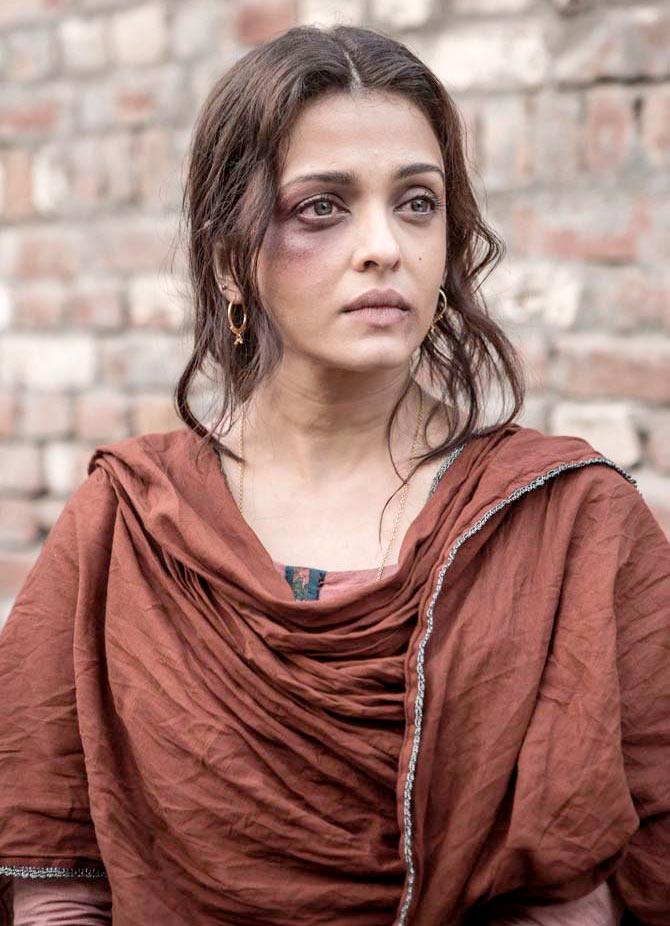
How did you work on your character's ageing over two decades?
My character goes into a range of ageing. The ageing was not technical, the scenes haven't been broken down to specific years. But there are definite episodes. A lot of things were also vague, as we were not sure about the years, so we made our own assessment... Omung and I worked together.
There was premature greying, due to the running around and the stress -- what will happen to your skin if you are out in the sun all the time? Also, when you're stressed, you either gain weight or lose it. So we had to take care of the physical changes.
I made my own chart for the detailing, along with my assistant Madhavi (Deshpande). We went nuts because we worked at a fast pace. We had to see which scene we were shooting that day, and accordingly grey my hair more or less.
The writing is strong. I think Utkarshini (Vashishtha, dialogue and screenplay writer) has done a brilliant job. It can touch your soul.
I don't prepare (for a character), I become it. I don't have to think about a character too much, I become it. I give a lot of attention to detailing. Once I become the character, I go and deliver the scene.
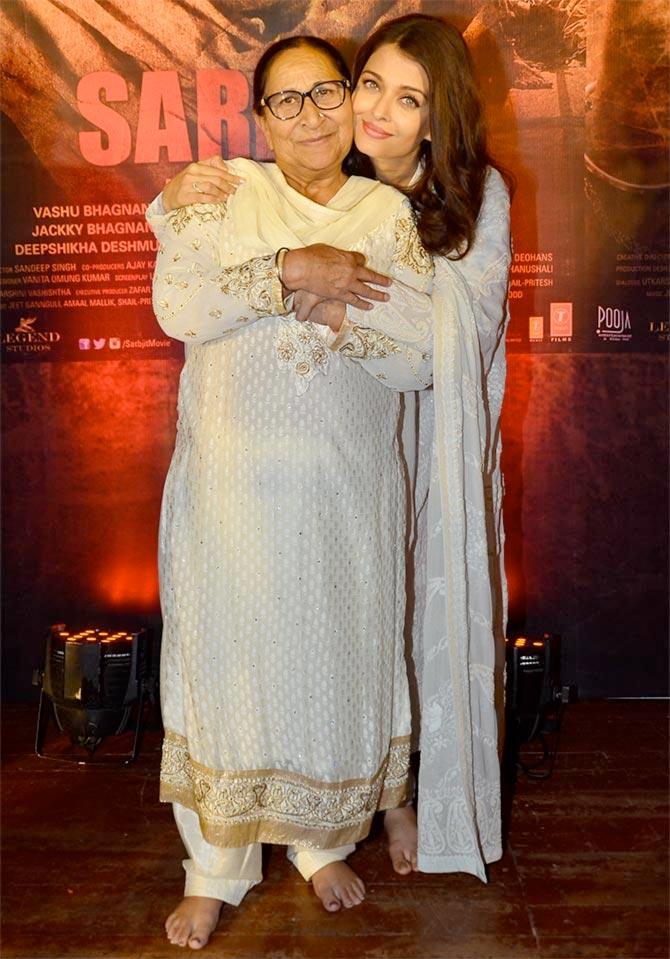
Did you meet Dalbirji before the shooting?
I consciously did not meet Dalbirji before the shooting.
We are playing real life characters, so for (the sake of) their family, it was necessary for us to retain the sensitivity.
The most important thing for us was that Dalbirji, Sukhpreetji (Sarabjit's wife) and the children Poonam and Swapan should feel this is their story.
If that family has let us in a sensitive aspect of their life, if they are okay with sharing with the rest of the world, it is a huge responsibility on us. I did not forget that even for a minute.
They saw the film and were moved.
Even during Provoked... I was doing a real life character for the first time, and I knew comparisons would be drawn, especially about the physicalities, because we don't look like each other. So I did not want to get into that. I focused on the writing.
Even when I have done adaptations like Choker Bali and Devdas, I did not watch the previous versions. I decided to follow that particular director's vision.
But Dalbirji's life has been documented well in the media, so I felt I should see the media interactions and speeches that she gave. It would give me the opportunity to observe her, in terms of her physical nuances -- the way she talks, the fire in her. So there was no need to meet her personally.
I met her for the first time on the first day of the shooting, when she came on the sets. That day, we were shooting Sarabjit and Dalbirji's first meeting in prison after 18 years. It was a huge moment for everybody.
Randeep (Hooda) and I were doing the most emotional moment in these two people's lives. We had not shot any other scene in the film, we directly jumped to the most emotional scene.
Today, when people watch the film, they will respond to the moment. It is such an emotional moment and to think that was the first scene that we had filmed!
Dalbirji and I did not need to speak that day. We just hugged and shared a very real moment. She did not say that the scene was good, or that I was good. There was none of that conversation, we had a real conversation.
When you look back at the film, how do you feel?
I got into the film very quickly. Omung gave me the idea when he was rushing to IIFA while I was doing Jazbaa media interactions. He met me for 15 minutes and quickly shared the idea.
When Omung mentioned the subject, it was already a 'yes' from me as I felt there was a divine connect because I had signed on a Sarabjit petition 10 years ago. Since there was a connection, I wanted to do the film.
Omung was confused when I said yes. He asked me, 'Are you saying yes because you're being polite?'
I told him I meant it.
Then he described a few more things about the film and I was overwhelmed. He told me he would give me a detailed narration after he returned.
We both got busy and I went into Ae Dil Hai Mushkil. After the shoot, I came back and Omung called me to ask if it was still a 'yes,' as the shooting would start in December.
I was very happy to come on board. I could see it was going to be very emotional experience.
During the shooting, people would ask me if I could snap out of it at the end of the day. I give my soul into every moment (of the shooting) but at the end of the day, I am Aaradhya's mom. As soon as pack up was announced, I would get into I-am-Aaradhaya's-mom-mode and get into life.
If I was a single actor, maybe I would have thought about it during the drive back home. But life isn't that way anymore, so I do not carry emotional baggage with me. That does not mean I was not involved because the emotions have to show on screen.
What Dalbirji has done is incredible. You cannot imagine how she would have got all that strength and resilience... one family's life in Punjab changed all of sudden. Any family would be crushed just thinking where they should go...
Dalbir Kaur is helping other people today.
Yes, she is helping people with similar problems. Dalbirji probably met a lot of people who shut the door on her but there were many others who gave her courage and support.
It took her 18 years to meet her brother for the first time. In those 18 years, so many things happened. He was sentenced to death by hanging... it was unthinkable.
After those 18 years, she had to wait for another five years for the sentence to be revoked. He was supposed to be released but there was a spelling error -- instead of Sarabjit, Surjit was going to be released.
The biggest thing is after 23 years of her struggle, she is not bitter. She still has that twinkle in her eyes. She is not disappointed in the system.
When we were promoting the film on Sa Re Ga Ma, she was smiling and being in the moment. She is sharing her story but she does not make life stop for those around.
After the movie screening, she came and spoke to me. I held her hand and actually started crying -- not because of the movie but I couldn't stop my tears because she was praising me and my work. I was telling her, 'this is your life'.
It must have been so difficult for her and her family to sit and watch that, and then come out and commend our professional work.
She didn't need to do that but she was still smiling and hugging and being so nice about everything.
I took her aside and that's when she broke down. We, including Sukhpreetji and Swapan, shared a real moment there. Poonam could not make it for the screening.
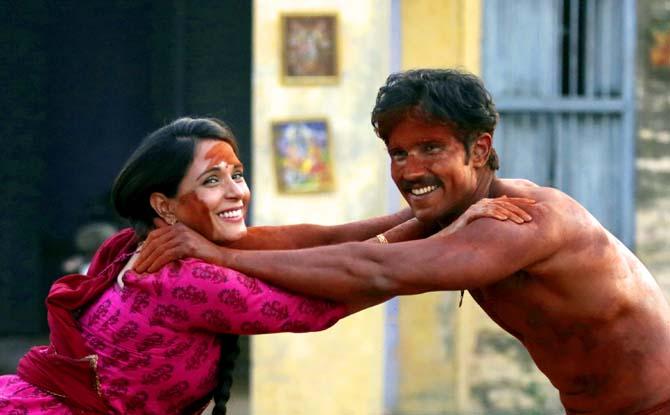
Do you think Randeep was the perfect Sarabjit?
Everybody was perfect.
Randeep is a very good actor, so is Richa (Chhada) and Darshan (Kumaar). Everybody was sincere and kept it real.
I will constantly reiterate that Utkarshini's contribution is immense. So is (cinematographer) Kiran Deohans' contribution. If he did not capture it that way, it wouldn't have looked good.
Everybody stood to advantage with Omung and his wife Vanita because it was his vision.
We had a wonderful team.
I knew what I was going to do as far as make-up was concerned. They wanted Subhash (Shinde, make-up artist), so there was no need for me to bring my personal make-up artist.
I got Bhagyalaxmi (Padya, hairstylist), who has worked with me on films where I have had long Indian hair. I needed somebody who knows me.
Even Randeep had a fantastic team. I happened to know Renuka (Pillai, make-up specialist) and her sister Ambika (Pillai, hair stylist). I told Renuka she had done a terrific job with Randeep's look.
Randeep is committed to his craft. We met on the first day of the shoot. He was in his prison cell and I was behind it. We just met and did our scene because we both did not feel the need to chat with each other.
We connected at the end of the shoot.
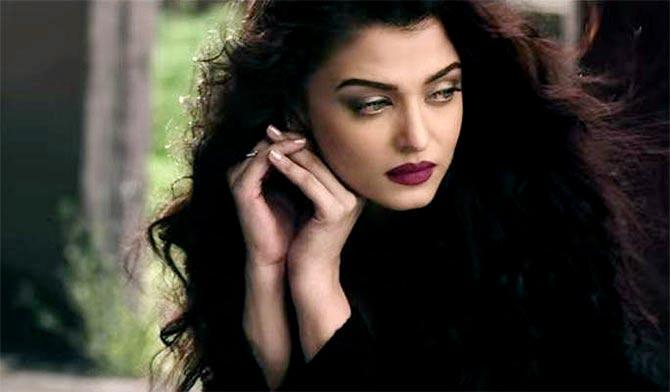
Do you feel that Sarbjit would have been a better comeback for you, instead of Jazbaa?
I am not that kind of actor who sits and analyses things. I don't look at my life like that.
I did Jazbaa because I liked the subject.
I did not want to think about which film I should do after motherhood, or after Miss World, which should be my launch film, or which film should I do after Devdas. After Devdas, I did Choker Bali. After marriage, I did Sarkar Raj and Pink Panther 2. I mix it all.
Around the time I got Jazbaa, I was discussing a lot of subjects with directors, but was still busy with Aaradhya and was postponing things every time.
Gupts (Sanjay Gupta, director) said he will start the film, and that's how we started shooting. It was a fabulous team to work with: Irrfan (Khan) and Shabana (Azmi). Gupts has style, the content is interesting and new. It was challenging because I had not played a lawyer yet.
Do you have any plans to produce films?
I am a part of everything; I get into my films completely. Like on the sets of Sarbjit, they called me an AD (assistant director).
I think like a producer. I say 'no, we don't have to spend on this'.
I have always been a director, a producer, a writer, a co-actor...
But I always say production is open-ended, I will cross the bridge when I reach it.
I have a very full personal and professional life because my attitude to life is full-throttle. Even my interview is full-throttle.
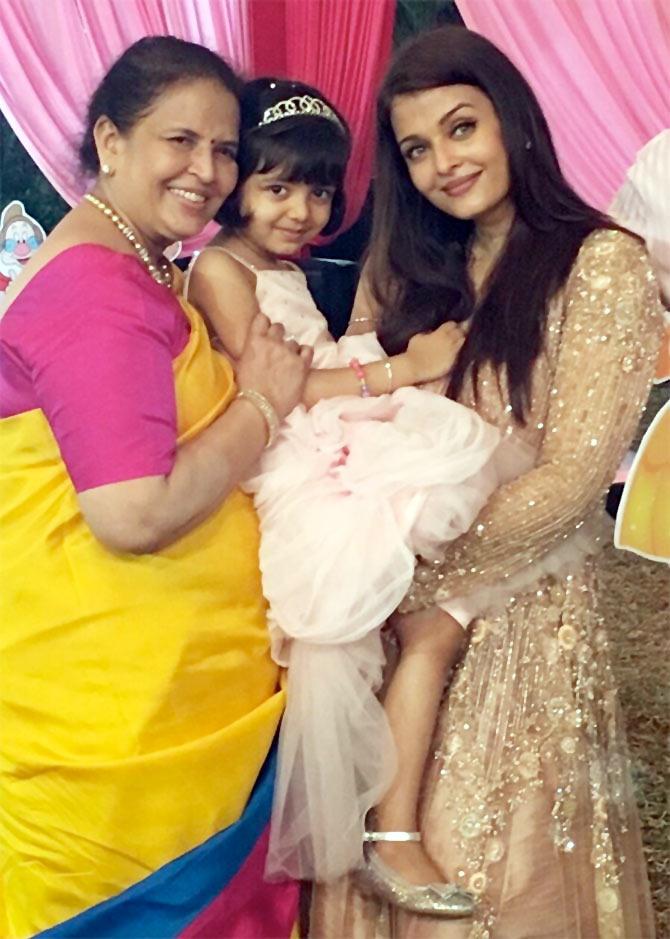
Do you take Aaradhya on the sets of your films?
No, I never take her on set.
I had to shoot eight-nine days every month (for Jazbaa). I would be exhausted but every morning I would drop her to play school and then go to work. Most days I would try and pick her up too.
On days when the locations were far away, my mum would pick her up and bring her to the sets. Aaradhya would take a nap during the drive, and then join me in the vanity van.
In the evenings, the shooting requires lighting, and during those breaks, I would spend time with her.
When you pack up, the traffic is at its worst in the evening. Why waste two hours (in the car)? I would rather be with her and spend quality time with her.
That's how Jazbaa worked out brilliantly. I will love that film forever.
I told her about the (Sarbjit) premiere and made her sleep early. Then, she said the sweetest thing: 'Oh, this is the film where you are playing Dalbir!'
I almost fainted because she took the name that she's been hearing me say during interviews.







